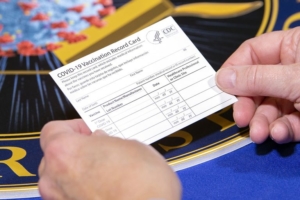Ensuring completion of series for the COVID-19 vaccine

By Nissa Shaffi, NCL Associate Director of Health Policy
After 10 dark months and over 350,000 lives lost, there is finally light at the end of the tunnel in the fight against COVID-19. Developing a vaccine for COVID-19 in such a short timeframe was made possible by dedicated efforts on the part of scientists, public health experts, and private and public partnerships. It is truly a triumphant medical achievement.
Now health care providers face another summit to scale—ensuring compliance for the vaccine to encourage efficacy and herd immunity. The leading vaccines for COVID-19, Pfizer BioNTech, and Moderna, will require *two doses to ensure efficacy. Evidence has shown that when a vaccine involves multiple doses, nearly 50 percent of patients fail to return for a second dose. Clearly, aside from the distribution and administration, ensuring completion of series for the vaccine will be a critical logistical challenge.
It is estimated that 75 to 85 percent of the population will need to be vaccinated in order to reach herd immunity. That’s a lot of people. And if we account for the odds of those who will receive the vaccine and do not complete their series, we’ve got a long road ahead before the pandemic is behind us.
While both the Pfizer BioNTech and Moderna vaccines were found to be 95 percent effective, require two doses, and use similar mRNA vaccine technology, they differ in timelines. The Pfizer BioNTech vaccine requires two doses that are spaced three weeks apart, and Moderna’s vaccine requires two doses that are spaced four weeks apart. Coordinating efforts to ensure that patients get the correct vaccine in a timely manner, will be a massive undertaking.
There are multiple barriers to address in order to enhance vaccine compliance to end the pandemic. The vaccine is expected to induce flu-like symptoms and may deter some patients from getting their second dose if they aren’t warned about what to expect. Common side effects of the vaccine include headache, fever, chills, soreness at the site of delivery, and fatigue, but patients will need transparency about all potential side effects.
All patients who receive the COVID-19 vaccine will be given vaccine cards (see below). These cards will help track the type of vaccine administered, the dosage, date, and other information pertinent to providers and patients to ensure the completion of a series. Similar to contact tracing, massive follow up will be required via text messages, along with other interventions to remind patients of their upcoming second dose.

The Food and Drug Administration (FDA) has issued a statement on the importance of properly adhering to FDA-issued vaccine guidelines. The vaccines have been issued with specified dosages and are scheduled at timed intervals. Individuals are instructed against reducing the number of doses (only taking one shot), extending the length of time between their booster vaccines, or changing guidance that is not rooted in evidence-based science, as it will directly impact the efficacy of the vaccine. Until new data is released by scientists and manufacturers of the COVID-19 vaccine regarding changes in dosage or schedules, FDA encourages continued adherence to its current issued guidance.
Vaccine hesitancy will surely further complicate matters. A study conducted by the Kaiser Family Foundation revealed that African Americans are increasingly skeptical of a COVID-19 vaccine. The findings allude to generational distrust of government and medical institutions by people of color, specifically, African Americans, where vaccine hesitancy has been influenced by lived experiences with discrimination and systemic racism. A successful vaccination plan will not only consider the herculean task of distribution and administration but should provide credible outreach within communities of color to foster confidence in the COVID-19 vaccine.
The National Consumers League continues to educate consumers on the importance of vaccine safety and compliance through our advocacy and engagement with the FDA. Our best line of defense against the pandemic is vaccine confidence and adherence. We encourage all who are able to get vaccinated for their own health and the health of their loved ones and community.
*Links are no longer active as the original sources have removed the content, sometimes due to federal website changes or restructurings















